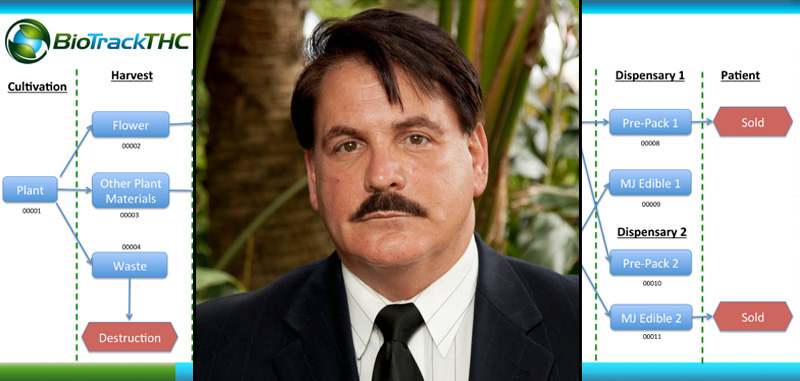
We recently had the opportunity to interview Dr. Steven Siegel, CEO of BioTrackTHC, a company which has been a leading pioneer of seed-to-sale tracking systems for cannabis markets. According to his website bio, Siegel is a serial entrepreneur who has “founded a health and nutritional products company (startup to $18 million in annual revenue), a chain of medical centers (startup to $7 million in annual revenue), a political auto-dialer technology firm, and a third-party financial clearinghouse.” We asked him about what it was like to transition from well-established industries to the fledgling cannabis industry, and what he predicts the future of legalized cannabis will look like.
Read the Q&A below:
Ganjapreneur: For anyone who doesn’t work in a store that uses BioTrackTHC, can you briefly describe how it helps cannabis businesses operate?
Steven Siegel: Compliance is essential to operating a cannabis business, both with regard to state law and to help avoid federal investigation. BioTrackTHC provides a rock solid means of compliance, from seed to sale, giving cannabis business operators great confidence in the propriety of their business. BioTrackTHC’s standard tracking program assigns unique numerical identifiers to every part of a company’s operations and inventory movements. The same assigned value is extended to cover exact monetary denominations made through the sale of each product, which can then be tied to individual bank, credit card, or debit transactions.
How many different states does BioTrackTHC serve, between recreational and medical markets?
We currently have customers in 16 states as well as three countries.
What was the transition like, as an entrepreneur who had started several successful businesses already, moving from well-established industries to an entirely new industry with virtually no infrastructure and plenty of legal inconsistency?
One word I would use to describe it is frightening. Normally, there’s data that you can research, even in a ditch market, to try to minimize risk and become an educated entrepreneur. With cannabis there was no data and it was just a gut feeling that me and my partner had. I also knew there was plenty of opportunity to provide leadership to help create an industry that works the right way and follows best practices. This industry is under particular scrutiny because of the differences between federal and state laws, so it was incumbent on those of us who were early in the sector to hold ourselves and each other to very high standards. That’s an important legacy that will serve the industry well into the future.
When did you first get involved with BioTrackTHC?
The company was officially formed in 2007, though we started working on tracking marijuana a few years earlier when we saw the industry coming. The company was created out of Bio-Tech Medical Software, which was in the business of tracking pharmaceuticals. This expertise was most helpful in our efforts to create a marijuana tracking technology and company, though it was still a major challenge. We spent several years in research and development to get the capability right for marijuana, which is complex to track.
How many people does the company employ?
We currently have 45 employees, though the number is growing quite rapidly.
A common theme in the cannabis industry is rapid response to opportunity. What was it like applying for Washington State’s seed-to-sale tracking system contract, and what were some of the obstacles you faced along the way?
It was an extreme experience for our team, several of whom moved to Washington state and lived and breathed the contract application process for months. We piled high many cans of energy drinks during that period of time and the biggest obstacles were that everyone was creating a new industry and means of regulation from scratch, both the regulators and our team.
It involved intricate communication to make sure that everyone was on the same page, not only with what we were trying to accomplish, but being certain we had the same understanding of terminology. This is unlike mature industries that have a well-understood and accepted language. A minor difference in meanings of words could have a major impact on the outcome of our mutual work with regulators. It’s a testament to everyone involved at the state and with our company that we collaborated in an effective manner that resulted in BioTrackTHC receiving the contract.
Where do you see the cannabis industry five years from now?
I expect it to be a very mainstream industry by then because there are so many business sectors that are becoming part of the legal cannabis industry. Insurance, law, accounting, marketing, banking, lighting, energy management, edibles, drinks and countless products and services of all kinds are becoming the norm. A federal law to legalize will of course hasten the process, but even if that has not occurred five years from now there will be many other legal states and the business in current states will have matured and provided tremendous economic and job growth for those regions. There will also be many real life stories of people being helped by cannabis, which will be tremendously beneficial to the industry.
Thank you for contributing, Steven! We look forward to seeing BioTrackTHC used by markets around the world as this industry grows.
If you have further questions, please feel free to post them in the comment area below or get in touch with BioTrackTHC via their contact page. Want more updates like this? Subscribe to our newsletter using the form in the sidebar, or download our Android app to get every story delivered to your smartphone or tablet!
